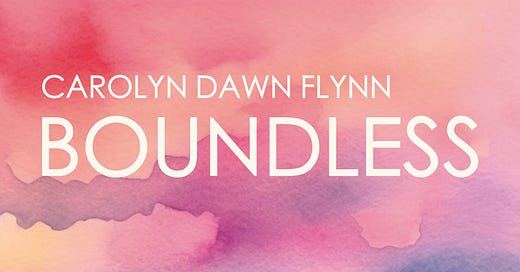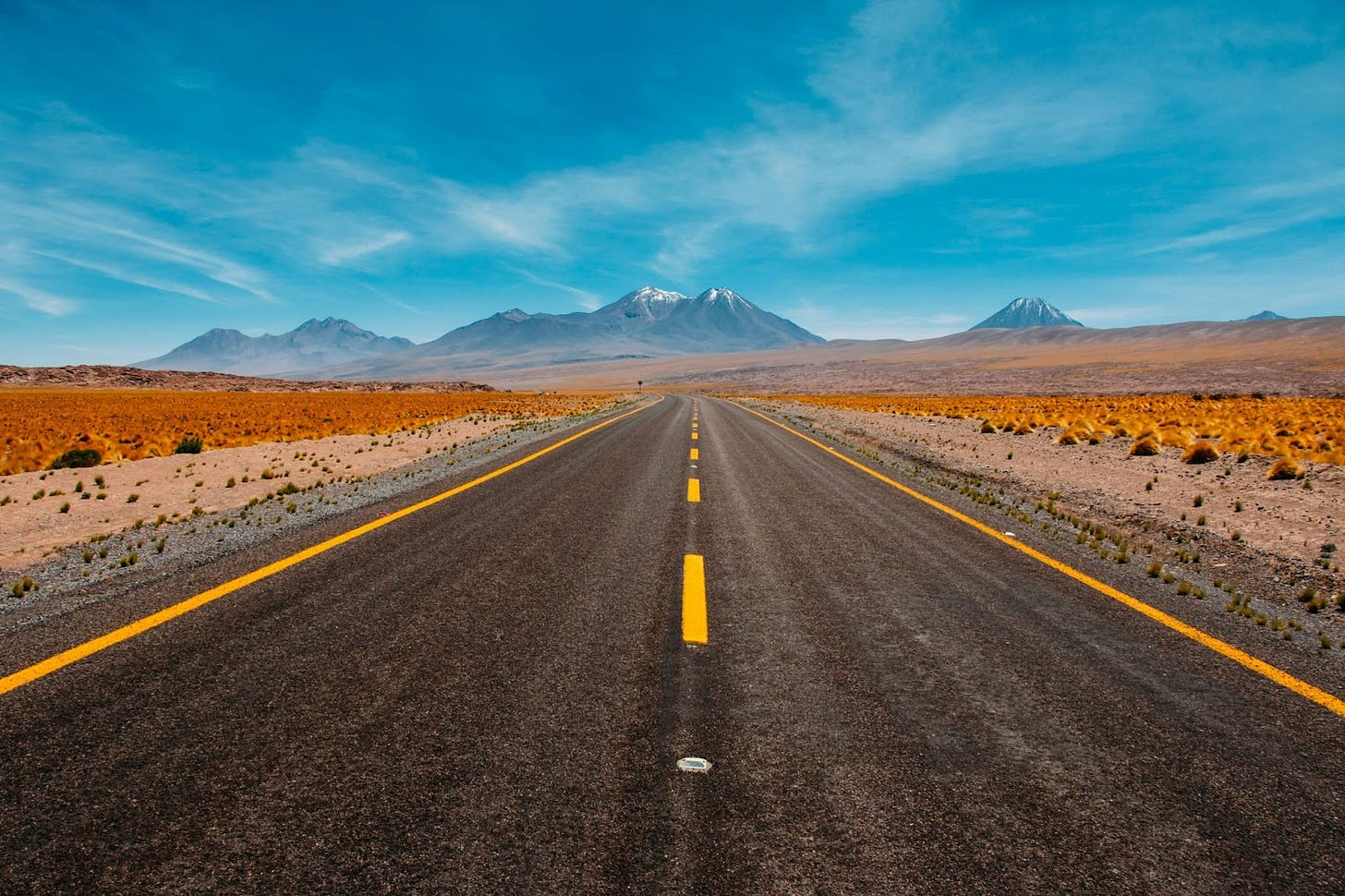The Self As the Highway to Our Stories
Notes from a Reluctant Memoirist, Or Why I Keep Getting Pregnant with Memoirs When I’m Really a Fiction Writer.
I am a reluctant memoirist.
For a long time I have viewed Boundless, which publishes in December 21, 2024, as the exception, not the rule. Just this one story, only this one. It had to be written, and that’s because every time I thought about the story, it unstitched me.
One memoir for me, I vowed, then out I was. Sew up the open vein, then get back to novels where I belonged.
My great love is fiction. That’s the stuff you get to make up vs. the true-life stuff that makes you say, “you can’t make this stuff up.”
Only just one problem: As I wait for Boundless to come out, I’m working on a new memoir, “Dear Grace.” Oh dear…
Boundless is available for pre-order!
My memoir about how we are always becoming someone new is arriving with perfect timing -- on a day of rebirth, Winter Solstice, which happens to be my birthday. Mark the date -- 12.21.2024! Read about it here. Get on the pre-order list here.
BOOKSHOP - proceeds go to Bookworks, an independent bookstore in Albuquerque
Take the Highway to Your Story
The inherent flaw in memoir is that focusing on yourself means laying yourself bare on the page. In memoir, the rule is that everyone else in your book gets lifted up; the person who looks bad is you. Thus my reluctance.
Plus, part of the memoirist’s choice to tell a story through the self feels narcissistic, a self-absorption that fails to take into account that others suffer with this pain or, most likely, with greater suffering than yours.
(On this count, I am reminded of Scottish writer Victoria MacKenzie’s “For Thy Great Pain, Have Mercy on My Little Pain,” which weaves together the spiritual adventures of Margery Kempe and Julian of Norwich. Which is the greater pain, the deeply felt pain of a sensual woman who had fourteen children and loved Christ with all her heart or the deeply felt pain of a woman who chose to die to the world for her love of Christ? Both lives are arguments against the patriarchy.)
Part of the memoirist’s choice to let the self be of use for a story feels nihilistic. Like I’m obliterating myself to tell a larger story. If I pour all of myself out here on the page, will there still be a self who is here, living my life after the page? (For a ray of light on this, read Dani Shapiro, a serial memoirist and author of the craft book, “Still Writing.”)
Yet, the truth is, a memoir is neither narcissistic or nihilistic—it is a generous choice. The memoirist offers the self as the highway to the story. The self isn’t the story. It’s the way through the murk. It’s the way across the desert.
“People want to connect. Above almost any other need, human beings long to have another person look into their faces with love and acceptance.”
~David Brooks, How to Know a Person: The Art of Seeing Others Deeply and Being Deeply Seen
‘Curious Girl with a Notebook’
All my life, I’ve been practicing the journalistic gaze. Since I was 17, I’ve played the role of “Curious Girl with a Notebook.” I entered journalism school as a practical highway to storytelling that I was sure would eventually arrive at novelist. There, I got boot-camped in the training of objectivity, the idea that the self was never in the story.
From the first day I played “Curious Girl with a Notebook,” it was obvious that the very fact that there was an observer to the story shaped the story. The observer shows up with eager questions everyone else is asking (if the subject is a famous person) or the questions no one else is asking (if the subject is an untold story of murder, corruption and intrigue).
People want to be seen. As The New York Times columnist David Brooks writes in his book “How to Know a Person: The Art of Seeing Others Deeply and Being Deeply Seen”, “People want to connect. Above almost any other need, human beings long to have another person look into their faces with love and acceptance.”
As a shy young woman, the last thing I could ever imagine was asking people to bare their souls to me. Then I realized that was not hard at all. I realized people wanted to spill their inner thoughts to me, things they had thought about but hadn’t tested out loud with anyone. I became a sounding board. I soon learned that being a sincere listener was a superpower.
I had access to editors who had access to the “means of production”—also known as the gigantic roaring presses that rumbled in the cavern of our downtown production plant waiting for our words. I soon learned that as abundant as that felt to me, it also was quite appealing to sources. They saw me and my questions as the conduit to the rest of the world. I could become their voice.
“Not everything that is faced can be changed, but nothing can be changed until it is faced."
~James Baldwin
Living on both shores
For years, I lived on both shores—journalism and fiction. I’d go out and flood the world with my questions, pour the answers onto newsprint. Before the ink was dry on my inverted pyramid ledes, I’d hop back on the bridge across to the other shore: Fiction. The craft of the creative imagination. The place where anything could happen, like wardrobes that lead to the snowy woods of Narnia (The Lion, The Witch and The Wardrobe), like road trips that take the reader into the tortured heart of the American dream (Anywhere But Here, Mona Simpson).
Beneath everything here is my great love for seeking the truth. The gritty factual truth and the unpleasant demands it makes on us to face it. It was James Baldwin who said, “Not everything that is faced can be changed, but nothing can be changed until it is faced." That’s my encampment in journalism. I do believe that truth can speak to power.
But I also love the authentic emotional truth. Here is where fiction comes in. The studies show that readers can be emotionally transported in a story, and this evokes empathy and changes our behavior.
What other ways could I love the truth? With that question, I was about to discover an ever more astonishing truth.
“What happened to the writer is not what matters; what matters is the large sense that the writer is able to make of what happened.”
~Vivian Gornick
Marveling at the astonishment, making sense of it
Astonishment rolls out from the Department of “You Can’t Make This Stuff Up.” From the question that provoked “how this could really have happened and why did it happen to me?” comes, “Does this happen to other people?” So many magazine stories I assigned were born of that leap to empathy. And that inquiry became the next question, “How am I to make sense of this existence?” Then: “How do we make sense of this uncanny existence together?”
Yet marveling at the truth of how things happened is not enough. It has to be a story. All stories are about change.
I often tell author clients that the art of memoir is selection. By that I mean, the choices the memoirist makes to tug on the plotlines and sensory details are what make a life a story.
Too many memoirists get lost in the parade of events—a book that is just a chain of situations. A situation is not a story, as Vivian Gornick writes in her craft book, “The Situation and the Story.” “What happened to the writer is not what matters; what matters is the large sense that the writer is able to make of what happened.”
This idea presented to me an irresistible challenge. Could I see the spine of story, making meaning of my own life? Could I bring to bear all the powers of literary techniques so I could tell the astonishing story? (On turning life into art, the path of Boundless)
The Memoir Muse whispers
I was about to see that the bridge wasn’t a bridge but another vantage point entirely. When I got accepted to the Spalding MFA in Writing program (now Naslund-Mann School of Writing) in 2008, I got accepted in two genres—fiction and creative nonfiction. They asked me: For the first year, would I do CNF? The fiction cohorts were full. No problem, I said, feeling adept at bridge-hopping.
Oh no, dear one, whispered the Memoir Muse gently, you have much to learn. It wasn’t long before I was stumbling around on both shores, losing my footing in journalism the same time I was falling down the banks of fiction, wondering why I couldn’t just shotgun-wedding these two things together.
Like any Curious Girl with a Notebook, I set out for the answer. Because creative nonfiction is its own beautiful thing, I quickly learned. Because it is an emerging genre, and it’s a garden of forking paths. Something about the utter confusion and disintegration of the 21st century made us lean a little harder into the stories we could mold from the astonishing truth.
Now 24 years into this century, memoir genres have gotten together and made memoir babies. No longer is it just autobiography or narrative memoir—now we have immersion memoir; researched memoir; spiritual quest memoir; trauma memoir; political memoir; travel memoir; teaching memoir; hybrid blending poetry and memoir; hybrid blending reportage, poetic prose and oral history. And that will just keep happening.
Memoir has its own set of literary techniques that borrow from my two loves, journalism and fiction, and it has procreated more.
When I confessed my reluctance at embarking on a second memoir, an author friend said to me, “We have to find out why you keep getting pregnant with memoirs.”
I said, “As in, young lady, who is climbing through your bedroom window at night?”
Such fertile ground, this space.
I’ll Be Back One Day
How do I know I’ll be back to memoir? I’m writing a new one, and it feels good. It seems appropriate to close us out with “I’ll Be Back One Day” from Lord Huron.
More posts on “Behind the Scenes with Boundless”
Welcome to My Book! Boundless Has A Cover Now
https://carolynflynn.substack.com/p/welcome-to-my-book-boundless-has
Why My Book is Nothing But a House of Cards
https://carolynflynn.substack.com/p/why-my-book-is-nothing-but-a-house?utm_source=publication-search
Why the Acknowledgments at the Back of Your Book Are a Gratitude Practice
https://carolynflynn.substack.com/p/why-the-acknowledgments-at-the-back
Why I Wrote Boundless, and Why It Wouldn’t Let Me Go
https://carolynflynn.substack.com/p/why-i-wrote-boundless-and-why-it
Why Writing Your Book Will Change You As Much As It Will Change the World
https://carolynflynn.substack.com/p/why-writing-your-book-will-change
From Lived Experience to a Book: The Path of My Memoir, Boundless
https://carolynflynn.substack.com/p/from-lived-experience-to-a-book-the







I love memoirs and this one sounds run up my alley. I'm totally putting it on my winter reading list :) Congrats!